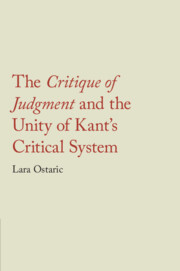Book contents
- The Critique of Judgment and the Unity of Kant’s Critical System
- The Critique of Judgment and the Unity of Kant’s Critical System
- Copyright page
- Contents
- Acknowledgments
- Note on Sources
- Kant’s Writings by Abbreviations Used for German Titles with Corresponding Translations
- Introduction
- Part I The Highest Good and the Postulates
- Chapter 1 Kant’s Justification of the “Fact of Reason” and the Objective Reality of Freedom from a “Practical Point of View”
- Chapter 2 The Highest Good and the Realism of Moral Glaube
- Chapter 3 Reflective Judgment and the Realism of the “Moral Image”
- Part II Aesthetic Judgment and the “Moral Image”
- Part III Teleological Judgment and the “Moral Image”
- Bibliography
- Index
Chapter 3 - Reflective Judgment and the Realism of the “Moral Image”
from Part I - The Highest Good and the Postulates
Published online by Cambridge University Press: 15 August 2023
- The Critique of Judgment and the Unity of Kant’s Critical System
- The Critique of Judgment and the Unity of Kant’s Critical System
- Copyright page
- Contents
- Acknowledgments
- Note on Sources
- Kant’s Writings by Abbreviations Used for German Titles with Corresponding Translations
- Introduction
- Part I The Highest Good and the Postulates
- Chapter 1 Kant’s Justification of the “Fact of Reason” and the Objective Reality of Freedom from a “Practical Point of View”
- Chapter 2 The Highest Good and the Realism of Moral Glaube
- Chapter 3 Reflective Judgment and the Realism of the “Moral Image”
- Part II Aesthetic Judgment and the “Moral Image”
- Part III Teleological Judgment and the “Moral Image”
- Bibliography
- Index
Summary
The novelty in Kant’s conception of the highest good in the third Critique is not limited to its form, namely, that of an ethical community. Kant refers to his earlier conception of the highest good as having a reality only insofar as it is a necessary object for us. However, in the third Critique, the highest good must be also the end of nature. I argue in this chapter that it is the role of reflective judgment to represent nature as aiming toward the realization of the highest good in the world, so that it is no longer sufficient that we intellectually “conceive” its possibility but that we can also perceive it as furthered by nature. In this way, the highest good and the Idea of God as the object of moral Glaube receive a special kind of realism, which I will refer to as “moral image realism” (MIR).
Keywords
- Type
- Chapter
- Information
- Publisher: Cambridge University PressPrint publication year: 2023

